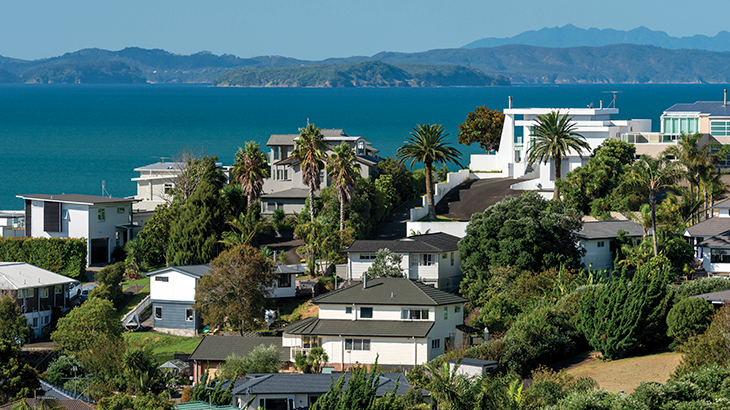View Auckland -
Is the tough still to come?

In a juxtaposition that sums up New Zealand’s economic confusion over the last 18 months, consumer, business and residential sentiment continues to rise, despite persistently high inflation, sharp falls in residential building consents, and company tax (which usually precludes cost cutting) indicating more challenging times ahead.
“The climate is indicative of a liquorice all-sorts economy – there is a bit of everything,” says economist Cameron Bagrie.
A TURNING TIDE?
Consumer confidence surveys show that Kiwis are feeling less favourable about their current financial positions across the country, but believe they will be better off a year out.
Providing cause for optimism, easing loan-to-value ratio (LVR) restrictions on 1 June has allowed banks to extend lending to borrowers with less than 20-percent deposits, while cutting the minimum investor deposit rate from 40 to 35 percent.
At the same time, tweaks to the Credit Contracts and Consumer Finance Act (CCCFA) have encouraged banks to be less restrictive with their credit assessments when analysing discretionary spending habits, which has helped to increase a successful applicant’s borrowing power.
These policy changes have supported modest rises in housing market activity, demonstrated by the Real Estate Institute of New Zealand’s (REINZ) House Price Index (HPI), lifting 1.2 percent in June.
“Some forces weighing against housing market activity have eased – with the Reserve Bank of New Zealand (RBNZ) in a pause mode and the balance of migration turning to a net inflow.
“While the central bank has conceded they have done enough to dampen consumer demand for now - which has resulted in a slight increase in positive market sentiment - they’ll be carefully watching the housing market over the next 12 months, ready to act at the if the sector continues to drive uncomfortable rises in inflation,” Bagrie says.
“With construction costs making it more costly to build a home, and house prices down around 15 percent from their peak, the existing housing stock is finding protection from inflation. It just makes more sense to buy existing (and maybe renovate) than build”, according to Bagrie.
CHALLENGES AHEAD
With news that consumer price inflation rose 1.1 percent in the June quarter and six percent over the last year, Bagrie says Kiwis aren’t out of the woods yet.
“Despite the economy cooling from highs, we’re still in that sugar rush stage of the cycle where demand is outstripping supply – which is inflationary,” he says.
“Consumer price inflation may have slowed from the peak of 7.3 percent last year, but it remains high by broad standards, and it’s clear we have a long way back to the RBNZ’s target band of between one and three percent.”
Bagrie expects the rubber to hit the road for Kiwis in 2024, as affordability remains a key headwind and mortgage lending rates elevated at a much higher level than before.
“It takes up to a year-and-a-half for monetary policy changes to fully filter through the financial system, having the desired effect on the economy – and what we have seen so far is an aggressive tightening cycle from the RBNZ designed to ease capacity constraints and control inflation.
“Kiwis haven’t yet seen the full impact of rising interest rates. There are $170 billion of mortgages to refinance in the coming year.”
While bank lending data from April shows the average fixed mortgage rate around five percent, more than one quarter of the value of all outstanding mortgages are set to be refixed before November, which will see many Kiwis roll off historically low mortgage lending rates onto something substantially higher.
“Many households will be tightening their belts to manage higher debt servicing costs better and also afford daily essentials like food – which has risen in price about 12 percent in the last year.
“In some parts of the county, homeowners are preparing for double-digit council rate increases, while the reinstatement of fuel excise tax and things like higher debt servicing stress test rates will continue to hammer Kiwis in their back pockets, rendering the financial hurdle of buying a home challenging for many.
“Simmering price pressures like this mean inflation is unlikely to return to a comfortable level any time soon.”
THE CASE TO ACT NOW
Should the toughest stuff be yet to come, Bayleys asks whether homeowners are in a relative sweet spot, the calm before the market storm?
Falling short of agreement, Bagrie concedes that market conditions have improved for buyers and sellers.
A low level of new listing numbers - down more than 20 percent year-on-year according to data from property platform realestate.co.nz - is helping to clear existing listings, with Kiwis still needing to make decisions about where and how they live.
“The fundamental need to buy and sell property is a constant feature of the market, with fewer new listings on the market helping to clear inventory faster than otherwise.
“In addition to this, net migration is tracking up around pre-pandemic levels, which puts pressure on the physical demand for housing – be it private residences or private rental supply.
“We’re seeing average weekly rental rates creep higher as a result, which continues to encourage first home buyers to exit the rental market and look to purchase their first home… if they can afford it.
“Investors are also exiting, which tightens up the availability of rental stock.”
Housing costs continue to be a key contributor to overall inflation readings, with rents rising 4.2 percent year-on-year.
“Buyers are being encouraged with more attractive pricing, and broad sentiment seems to be that the downside risk is limited now the RBNZ has held the Official Cash Rate (OCR) at 5.5 percent.
“Despite this, I wouldn’t rule out another rate hike in the coming months, with the central bank likely acting swiftly should they see any upward momentum in the housing market that poses a threat to its economic forecast,” Bagrie says.
“A stronger housing market is not consistent with inflation returning to 2 percent,” Bagrie notes.